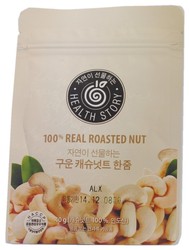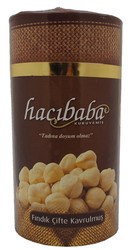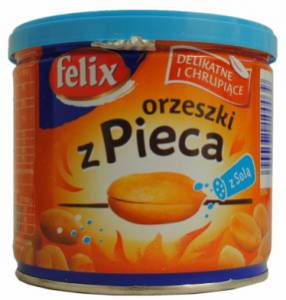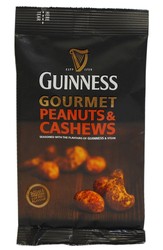Intersnack Poland, part of the German-based Intersnack Group, claims to be the leading player in the Polish nuts market with its well-established Felix range. The first nut snack under the Felix brand was introduced in 1991 and since then the product portfolio has been undergoing gradual expansion.
The nut market comes out of its shell with double roasted format
In an attempt to further crack the market, at the end of 2014 Intersnack launched Felix Orzeszki z Pieca (oven baked peanuts) with an aim to reach both experimental and health-driven snack consumers in Poland. Intersnack has explored a double-roasting process called ‘2.0 roasted’, which is new to the Polish market.
The technique requires no fat – addressing the need for lighter, yet indulgent treats. Moreover, it looks to appeal to those seeking a quick snacking fix. As the nuts are roasted twice, no greasy residue is left on hands, an essential attribute for convenience-seeking snackers. The company strongly believes that the new development will resonate with the needs of today’s salty snack consumers, who are open to innovation and added benefits. Intersnack has therefore announced plans to expand the range with new flavours beyond the initially launched salted variety.
Similar processing has been used by other brands across the global market. For example, Olive and Young Health Story 100% Real Roasted Cashew Nuts in South Korea, Guinness Gourmet Peanuts & Cashews in the UK and Hacibaba Double Roasted Hazelnuts in Turkey.


What do consumers think?
Polish consumers are going nutty for the roasted snack, with six in 10 consumers stating that roasted nuts are a good source of protein and vitamins, as well as being healthier than crisps or other salty snacks. However, a fifth of consumers view roasted nuts as unhealthy and are therefore limiting the amount they eat. On this basis, the latest launch from Intersnack is well placed to see success, as although it has a lower fat content, it doesn’t lose its flavour.
The strong preference for roasted varieties in nuts is also being addressed through increased launch activity in Poland. Between December 2011 and November 2012, a fifth of nut launches were described as ‘roasted’, while two years later this had grown to nearly a third.
There appears to be ample room for further innovation within nuts in Poland. Mintel research highlights that Polish consumers are the most likely of any European country surveyed to try new brands and flavours of nuts. As well as this, over two thirds of Polish consumers would like to see healthier nut options and half would buy more nuts if the salt content was lower. Packaging innovation is also an interesting opportunity to explore as Polish consumers are interested in buying nuts in large sharing bags.
Innovating around unique flavour profiles, for example hot, spicy, herbal and dessert style, as well as sweet and savoury combinations, is a tactic already adopted by some European nut brands and could serve as an inspiration for Polish manufacturers.
Polish brand owners could also look to explore new combinations of nuts and vegetables (vegetable-based flavours or vegetable pieces) in a bid to enhance the nutritional profile of their products and to address the needs of health driven consumers.
Honorata joined Mintel in 2013 as a Food and Drink Analyst for Poland. Her focus area is food categories with a particular interest in health and wellness trends as well as product innovations. With almost a decade of experience in market research, Honorata has analysed various sectors in Poland, including packaged food, retailing, beauty and personal care, home care, tissue and hygiene; consumer health, tobacco, pet food and pet care products.










































